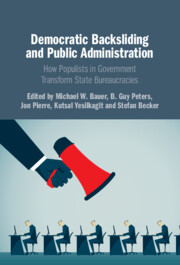 Democratic Backsliding and Public Administration
Democratic Backsliding and Public Administration Book contents
- Democratic Backsliding and Public Administration
- Democratic Backsliding and Public Administration
- Copyright page
- Contents
- Figures
- Tables
- Contributors
- Preface
- 1 Introduction: Populists, Democratic Backsliding, and Public Administration
- 2 Incomplete Democratization, System Transformation, and the Civil Service: A Case Study on the Weimar Republic and the Nazi Regime in Germany
- 3 Resilience Without Resistance: Public Administration Under Mutating Populisms in Office in Italy
- 4 Illiberal Transformation of Government Bureaucracy in a Fragile Democracy: The Case of Hungary
- 5 Public Administration in Poland in the Times of Populist Drift
- 6 Technocratic-Populist Mayors and Public Administration in Three European Cities
- 7 Populism and the Deep State: The Attack on Public Service Under Trump
- 8 “Doublespeak Populism” and Public Administration: The Case of Mexico
- 9 Venezuela: Sidelining Public Administration Under a Revolutionary-Populist Regime
- 10 Working, Shirking, and Sabotage in Times of Democratic Backsliding: An Experimental Study in Brazil
- 11 Public Administration: How to Respond to Populism and Democratic Backsliding
- 12 Conclusions: Public Administration Under the Rule of Democratic Backsliders
- References
- Index
6 - Technocratic-Populist Mayors and Public Administration in Three European Cities
Published online by Cambridge University Press: 17 August 2021
- Democratic Backsliding and Public Administration
- Democratic Backsliding and Public Administration
- Copyright page
- Contents
- Figures
- Tables
- Contributors
- Preface
- 1 Introduction: Populists, Democratic Backsliding, and Public Administration
- 2 Incomplete Democratization, System Transformation, and the Civil Service: A Case Study on the Weimar Republic and the Nazi Regime in Germany
- 3 Resilience Without Resistance: Public Administration Under Mutating Populisms in Office in Italy
- 4 Illiberal Transformation of Government Bureaucracy in a Fragile Democracy: The Case of Hungary
- 5 Public Administration in Poland in the Times of Populist Drift
- 6 Technocratic-Populist Mayors and Public Administration in Three European Cities
- 7 Populism and the Deep State: The Attack on Public Service Under Trump
- 8 “Doublespeak Populism” and Public Administration: The Case of Mexico
- 9 Venezuela: Sidelining Public Administration Under a Revolutionary-Populist Regime
- 10 Working, Shirking, and Sabotage in Times of Democratic Backsliding: An Experimental Study in Brazil
- 11 Public Administration: How to Respond to Populism and Democratic Backsliding
- 12 Conclusions: Public Administration Under the Rule of Democratic Backsliders
- References
- Index
Summary
Democratic backsliding and its effectsare gaining momentum within Public Administration research as populist parties start to implement their political agendas. Despite the increasing relevance of the topic, the local government is seldom mentioned. This gap is especially relevant as many populist parties govern at first and even only at the local level, playing a crucial role in shaping local politics, public services, and administrative reform. This chapter explores the strategies and the impact of technocratic populism on the public administration in three European cities. It investigates how technocratic populist parties and leaders in cities interact with bureaucracy and combine different strategies of democratic backsliding: centralizing of administrative structures, disciplining the bureaucracy, and controlling societal participation. It also examines the role of ICT tools and innovations within the populist strategies. The empirical analysis showed that technocratic populists employ, with varying success, strategies to transform public administration. However, there are also considerable differences among cases that point to heterogeneity within this populist category.
Keywords
- Type
- Chapter
- Information
- Democratic Backsliding and Public AdministrationHow Populists in Government Transform State Bureaucracies, pp. 127 - 150Publisher: Cambridge University PressPrint publication year: 2021


